
Yiddish theatre consists of plays written and performed primarily by Jews in Yiddish, the language of the Ashkenazi Jewish community. The range of Yiddish theatre is broad: operetta, musical comedy, and satiric or nostalgic revues; melodrama; naturalist drama; expressionist and modernist plays. At its height, its geographical scope was comparably broad: from the late 19th century until just before World War II, professional Yiddish theatre could be found throughout the heavily Jewish areas of Eastern and East Central Europe, but also in Berlin, London, Paris, Buenos Aires and New York City.
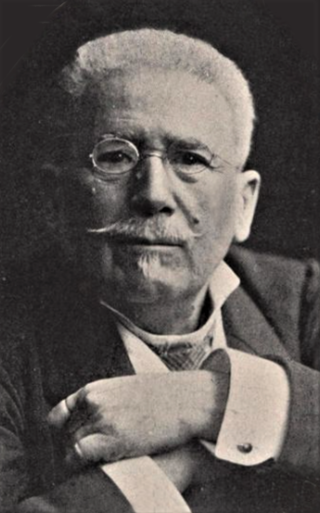
Abraham Goldfaden, also known as Avram Goldfaden, was a Russian-born Jewish poet, playwright, stage director and actor in Yiddish and Hebrew languages and author of some 40 plays. Goldfaden is considered the father of modern Jewish theatre.
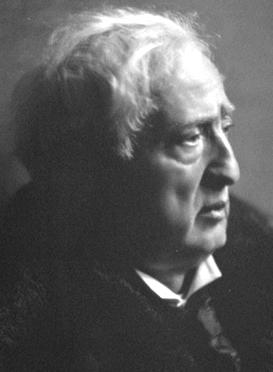
Jacob Pavlovich Adler was a Jewish actor and star of Yiddish theater, first in Odessa, and later in London and in New York City's Yiddish Theater District.
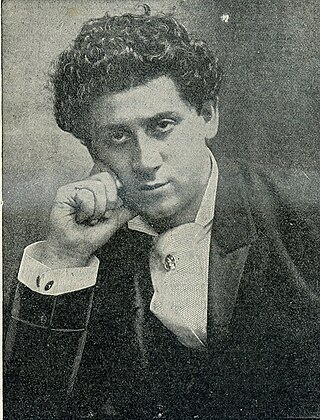
Boris Thomashefsky, born Boruch-Aharon Thomashefsky, was a Ukrainian-born Jewish singer and actor who became one of the biggest stars in Yiddish theater.

Jacob Michailovitch Gordin was a Russian-American playwright active in the early years of Yiddish theater. He is known for introducing realism and naturalism into Yiddish theater.
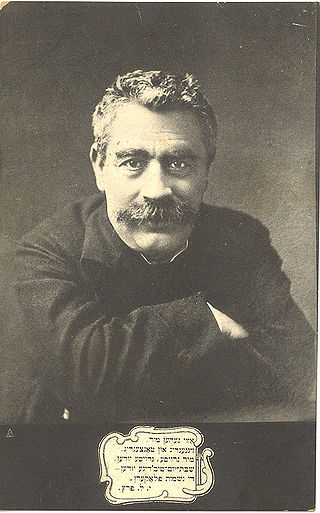
Isaac Leib Peretz, also sometimes written Yitskhok Leybush Peretz was a Polish Jewish writer and playwright writing in Yiddish. Payson R. Stevens, Charles M. Levine, and Sol Steinmetz count him with Mendele Mokher Seforim and Sholem Aleichem as one of the three great classical Yiddish writers. Sol Liptzin wrote: "Yitzkhok Leibush Peretz was the great awakener of Yiddish-speaking Jewry and Sholom Aleichem its comforter.... Peretz aroused in his readers the will for self-emancipation, the will for resistance against the many humiliations to which they were being subjected."
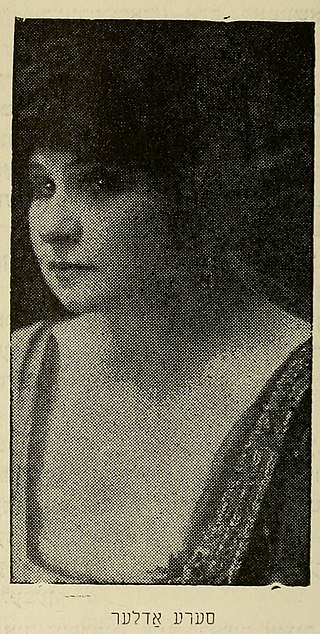
Sara Adler was a Russian actress in Yiddish theater who made her career mainly in the United States. She was known as the "mother" or "duchess" of Yiddish theater.

Celia Feinman Adler was an American actress, known as the "First Lady of the Yiddish Theatre".

David Kessler (1860–1920) was a prominent actor in the first great era of Yiddish theater. As a star Yiddish dramatic performer in New York City, he was the first leading man in Yiddish theater to dispense with incidental music.
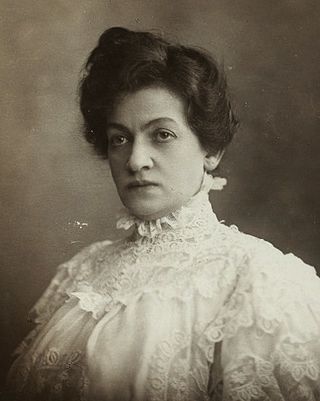
Keni Liptzin was a star in the early years of Yiddish theater, probably the greatest female dramatic star of the first great era of Yiddish theater in New York City.
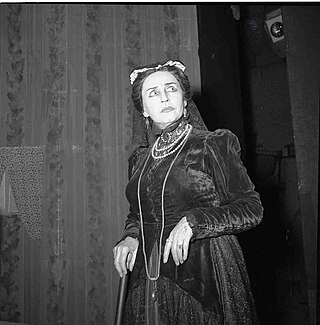
Mirele Efros was an 1898 Yiddish play by Jacob Gordin. Some have called it "the Jewish Queen Lear".
Dinah Shtettin was an English Yiddish theater actress. She was the second wife of Jacob Adler, with whom she had a daughter, Celia Adler, in 1889.
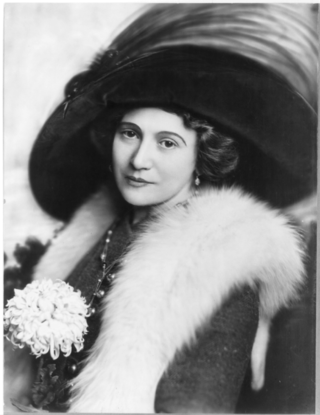
Bertha Kalich was a Jewish-American actress. Though she was well-established as an entertainer in Eastern Europe, she is best remembered as one of the several "larger-than-life" figures that dominated New York stages during the "Golden Age" of American Yiddish Theatre during the late nineteenth and early twentieth century. Historians estimate that, during her career, Kalich performed more than 125 different roles in seven different languages.
Leon Kobrin was a playwright in Yiddish theater, writer of short stories and novels, and a translator. As a playwright he is generally seen as a disciple of Jacob Gordin, but his mature work was more character-driven, more open and realistic in its presentation of human sexual desire, and less polemical than Gordin's. Many of his plays were "ghetto dramas" dealing with issues of tradition and assimilation and with generational issues between Jewish immigrants to America and the first generation of American-born Jews.

Maurice Schwartz, born Avram Moishe Schwartz, born in the Volhynia province of the Russian Empire, was a stage and film actor active in the United States. He founded the Yiddish Art Theatre and its associated school in 1918 in New York City and was its theatrical producer and director. He also worked in Hollywood, mostly as an actor in silent films but also as a film director, producer, and screenwriter.
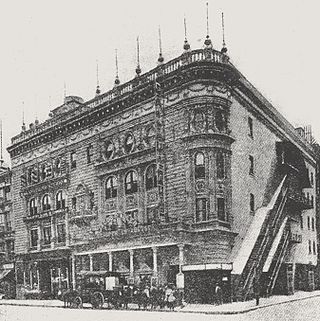
The Grand Theatre was a theatre in the Yiddish Theatre District in Manhattan in New York City built for Yiddish productions, the first of its kind. The theater was built in 1904 by Jacob Pavlovitch Adler, a famous Russian-born Jewish actor.

The Yiddish Theatre District, also called the Jewish Rialto and the Yiddish Realto, was the center of New York City's Yiddish theatre scene in the early 20th century. It was located primarily on Second Avenue, though it extended to Avenue B, between Houston Street and East 14th Street in the East Village in Manhattan. The District hosted performances in Yiddish of Jewish, Shakespearean, classic, and original plays, comedies, operettas, and dramas, as well as vaudeville, burlesque, and musical shows.
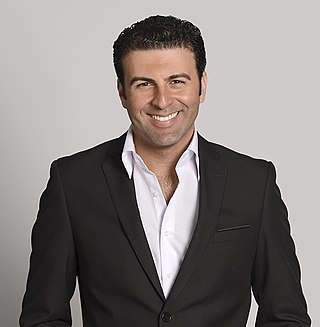
David Serero is a Moroccan-French baritone opera singer. He has played more than 1,500 concerts worldwide, and lead roles in opera, theater and musicals such as Cyrano (Cyrano de Bergerac), Shylock, Othello (Othello), Nabucco (Nabucco), Don Quixote, Richard III, Napoleon Bonaparte, Escamillo (Carmen), Enrico, Amonasro (Aida), the title roles of Don Giovanni and Rigoletto and starred in more than 100 films and TV series. He has toured in America, Europe, Middle East, Asia and Russia. In 2017, David Serero was honored in Marquis Who's Who for outstanding achievement in the entertainment world and for his contribution for the betterment of contemporary society. He is a member of the Recording Academy (Grammys) and the Television Academy of Arts & Sciences (Emmys), for which he is both a voting member. In 2019, he is named one of the top most influential Moroccans by airline Royal Air Maroc, and received the 2019 Albert Nelson Marquis Lifetime Achievement Award. In 2020, he receives the Award for Diversity by the Unesco. He wins the 2020 BroadwayWorld Awards for Best Performer of the decade, Best Producer of a Musical of the decade, Best Producer of a Play of the decade. The Mayor of New York, Bill de Blasio, awards him with the Certificate of Recognition for his contributions to the City of New York.

Shylock is a fictional character in William Shakespeare's play The Merchant of Venice. A Venetian Jewish moneylender, Shylock is the play's principal villain. His defeat and conversion to Christianity form the climax of the story.

Joseph Brody was an American Jewish composer who wrote for the Yiddish theatre as well as liturgical Jewish works. He taught George Gershwin and was a friend of Yossele Rosenblatt. His daughter, Estelle Brody, was an actress.



















